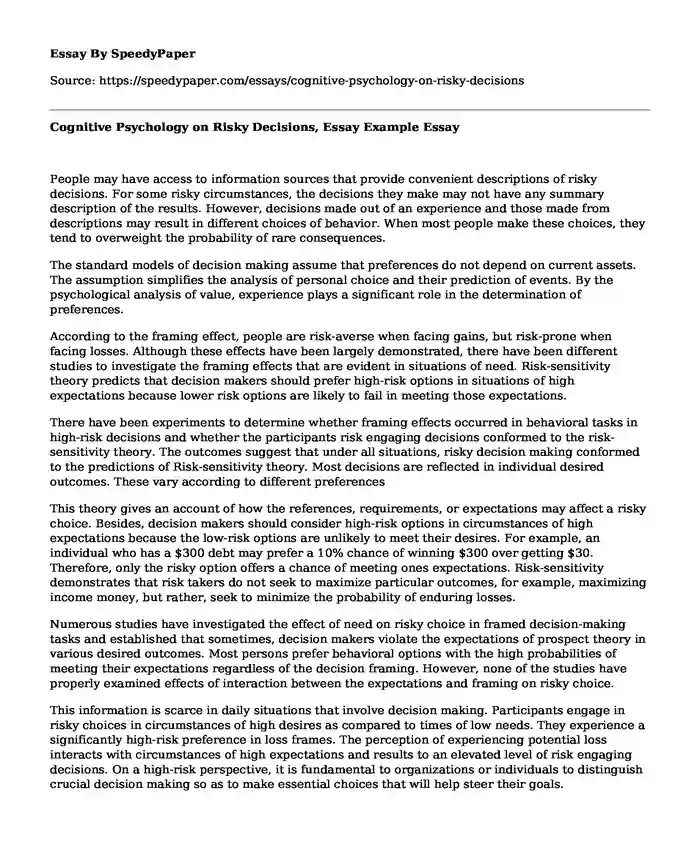
| Type of paper: | Essay |
| Categories: | Psychology |
| Pages: | 2 |
| Wordcount: | 536 words |
People may have access to information sources that provide convenient descriptions of risky decisions. For some risky circumstances, the decisions they make may not have any summary description of the results. However, decisions made out of an experience and those made from descriptions may result in different choices of behavior. When most people make these choices, they tend to overweight the probability of rare consequences.
The standard models of decision making assume that preferences do not depend on current assets. The assumption simplifies the analysis of personal choice and their prediction of events. By the psychological analysis of value, experience plays a significant role in the determination of preferences.
According to the framing effect, people are risk-averse when facing gains, but risk-prone when facing losses. Although these effects have been largely demonstrated, there have been different studies to investigate the framing effects that are evident in situations of need. Risk-sensitivity theory predicts that decision makers should prefer high-risk options in situations of high expectations because lower risk options are likely to fail in meeting those expectations.
There have been experiments to determine whether framing effects occurred in behavioral tasks in high-risk decisions and whether the participants risk engaging decisions conformed to the risk-sensitivity theory. The outcomes suggest that under all situations, risky decision making conformed to the predictions of Risk-sensitivity theory. Most decisions are reflected in individual desired outcomes. These vary according to different preferences
This theory gives an account of how the references, requirements, or expectations may affect a risky choice. Besides, decision makers should consider high-risk options in circumstances of high expectations because the low-risk options are unlikely to meet their desires. For example, an individual who has a $300 debt may prefer a 10% chance of winning $300 over getting $30. Therefore, only the risky option offers a chance of meeting ones expectations. Risk-sensitivity demonstrates that risk takers do not seek to maximize particular outcomes, for example, maximizing income money, but rather, seek to minimize the probability of enduring losses.
Numerous studies have investigated the effect of need on risky choice in framed decision-making tasks and established that sometimes, decision makers violate the expectations of prospect theory in various desired outcomes. Most persons prefer behavioral options with the high probabilities of meeting their expectations regardless of the decision framing. However, none of the studies have properly examined effects of interaction between the expectations and framing on risky choice.
This information is scarce in daily situations that involve decision making. Participants engage in risky choices in circumstances of high desires as compared to times of low needs. They experience a significantly high-risk preference in loss frames. The perception of experiencing potential loss interacts with circumstances of high expectations and results to an elevated level of risk engaging decisions. On a high-risk perspective, it is fundamental to organizations or individuals to distinguish crucial decision making so as to make essential choices that will help steer their goals.
References
Dukas, R. (2009). Cognitive ecology II. Chicago: University of Chicago Press.
Crandall, B., & Klein, G. (2006). Working minds a practitioner's guide cognitive task analysis. Cambridge, Mass.: MIT Press.
Meziani, S. (2010). Advances in cognitive systems. London: Institution of Engineering and Technology.
Gazzaniga, M. (2004). The cognitive neurosciences (3rd ed.). Cambridge, Mass.: MIT Press.
Cite this page
Cognitive Psychology on Risky Decisions, Essay Example. (2019, Jul 17). Retrieved from https://speedypaper.com/essays/cognitive-psychology-on-risky-decisions
Request Removal
If you are the original author of this essay and no longer wish to have it published on the SpeedyPaper website, please click below to request its removal:
- Essay Sample about Locus of Control as a Factor to Academic Failure
- Essay Example: Social Inequality in Education
- Essay Example about the Community Brand Paradigm
- HRM Essay Sample: The Moderating Role of Organizational Commitment
- Essay Example: Role of Pre-Marital Counseling in Successful Marriages
- Essay Sample: Correctional Personnel and the Public Image of Corrections
- Free Essay in Finance: Amazon Financial Performance and Health
Popular categories




